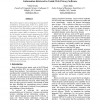201 search results - page 6 / 41 » A Utility-Theoretic Approach to Privacy and Personalization |
107
click to vote
PERCOM
2009
ACM
16 years 2 months ago
2009
ACM
In pervasive computing environments, personal information is expressed in digital forms to a great extent. Daily activities and personal preferences may be easily associated with p...
119
click to vote
WEBI
2005
Springer
15 years 7 months ago
2005
Springer
We present a generic natural language processing (NLP) architecture, acronym QTIL, based on a system of cooperating multiple agents (Q/A, T, I, and L agents) which can be used in ...
138
click to vote
PAISI
2010
Springer
14 years 11 months ago
2010
Springer
Abstract. This paper introduces an efficient privacy-preserving protocol for distributed K-means clustering over an arbitrary partitioned data, shared among N parties. Clustering i...
RAID
2000
Springer
15 years 5 months ago
2000
Springer
Abstract. Privacy and surveillance by intrusion detection are potentially conflicting organizational and legal requirements. In order to support a balanced solution, audit data is ...
EDBTW
2010
Springer
15 years 8 months ago
2010
Springer
While data privacy is a human right, it is challenging to enforce it. For example, if multiple retailers execute a single order at Amazon Marketplace, each retailer can use diffe...

